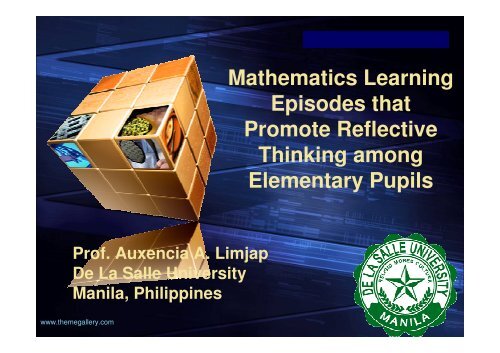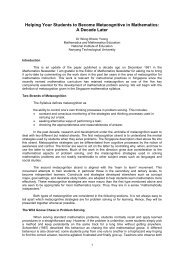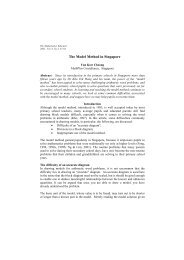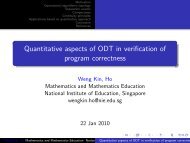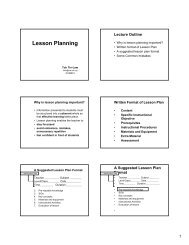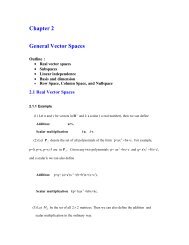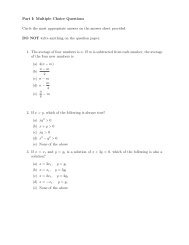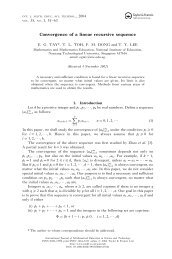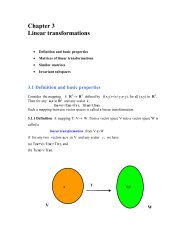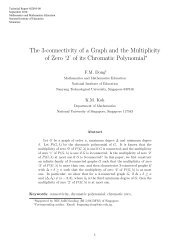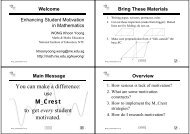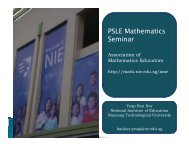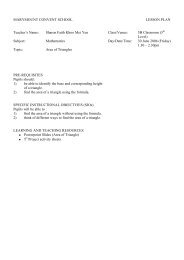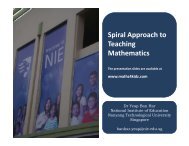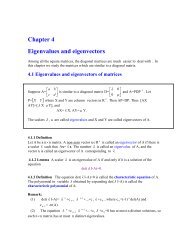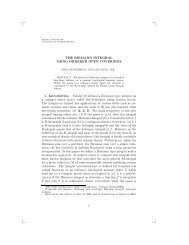Download - NIE Mathematics & Mathematics Education
Download - NIE Mathematics & Mathematics Education
Download - NIE Mathematics & Mathematics Education
You also want an ePaper? Increase the reach of your titles
YUMPU automatically turns print PDFs into web optimized ePapers that Google loves.
“ Add your company slogan ”<br />
<strong>Mathematics</strong> Learning<br />
Episodes that<br />
Promote Reflective<br />
Thinking among<br />
Elementary Pupils<br />
Prof. Auxencia A. Limjap<br />
De La Salle University<br />
Manila, Philippines<br />
www.themegallery.com<br />
LOGO
Contents<br />
1<br />
2<br />
3<br />
4<br />
5<br />
6<br />
7<br />
Transformative Learning<br />
Defining Reflection<br />
Dewey’s Criteria for Reflection<br />
Lasallian Pedagogical Framework<br />
Learner Centered Learning Environment<br />
Manifestations of Reflective Thinking<br />
Promoting Reflective Lasallian <strong>Education</strong>
TRANSFORMATIVE LEARNING<br />
Dr. Jack Mezirow<br />
“Learning is the process of using<br />
a prior interpretation to construe a<br />
new or revised interpretation of the<br />
meaning of one’s experience to<br />
guide future action.”<br />
Retrieved from: http://www.konnections.net/lifecircles/mezirow.htm
TRANSFORMATIVE LEARNING<br />
Dr. Jack Mezirow<br />
Three common themes that<br />
characterized Mezirow's theory of the<br />
mechanism of transformational learning<br />
in the classroom:<br />
• Student’s life experience<br />
• Critical Self Reflection<br />
• Critical Discourse<br />
Retrieved from: http://www.konnections.net/lifecircles/mezirow.htm
TRANSFORMATIVE LEARNING<br />
Dr. Jack Mezirow<br />
Ten phases of transformative learning<br />
1. A disorienting dilemma<br />
2. Self examination<br />
3. A critical assessment of assumptions<br />
4. Recognition of a connection<br />
between one’s discontent and<br />
transformation
TRANSFORMATIVE LEARNING<br />
Dr. Jack Mezirow<br />
Ten phases of transformative learning<br />
5. Exploration of options for new roles,<br />
relationships and actions<br />
6. Planning a course of action<br />
7. Acquiring knowledge and skills for<br />
implementing one’s plan<br />
8. Provisional trying of new roles
TRANSFORMATIVE LEARNING<br />
Dr. Jack Mezirow<br />
Ten phases of transformative learning<br />
9. Building competence and selfconfidence<br />
in new roles and<br />
relationships<br />
10. A reintegration into one’s life on the<br />
basis of conditions dictated by one’s<br />
new perspectives. (Mezirow & Taylor, 2009)
Defining Reflection<br />
Reflective<br />
Thinking<br />
John Dewey (1933)<br />
Reflection is a<br />
complex,<br />
rigorous,<br />
intellectual,<br />
and emotional<br />
enterprise that<br />
takes time to<br />
do well.<br />
It is an active,<br />
persistent, and careful<br />
consideration of a<br />
belief or supposed<br />
form of knowledge, of<br />
the ground that<br />
support knowledge,<br />
and further<br />
conclusions to which<br />
that knowledge leads.
Dewey’s Criteria for Reflection<br />
Reflection is a meaning making process<br />
that moves a learner from one<br />
experience into the next with deeper<br />
understanding of its relationships.<br />
It is a systematic, rigorous, disciplined ways<br />
of thinking with roots in scientific inquiry.<br />
It needs to happen in community<br />
in interaction with others.<br />
Reflective<br />
Thinking<br />
It requires attitudes that value the personal<br />
& intellectual growth of oneself & of others.
St. John Baptist De La Salle
LASALLIAN<br />
PEDAGOGICAL FRAMEWORK
PERSPECTIVE TRANSFORMATION<br />
KNOWLEDGE ACQUISITION<br />
Knowledge as<br />
information<br />
to be acquired<br />
by students<br />
Knowledge as<br />
a result of<br />
students’ inquiry,<br />
action or<br />
experimentation
PERSPECTIVE TRANSFORMATION<br />
ROLE OF THE TEACHER<br />
Teacher is the<br />
primary source<br />
of knowledge.<br />
Teacher<br />
facilitates<br />
students’<br />
identification<br />
of questions<br />
and develops<br />
with them<br />
inquiry plans
PERSPECTIVE TRANSFORMATION<br />
ROLE OF THE TEACHER<br />
Teacher is the<br />
primary source<br />
of knowledge.<br />
Teacher<br />
prompts<br />
students<br />
to take risks<br />
& explore<br />
multiple viewpoints<br />
by interacting<br />
& collaborating<br />
with one another.
PERSPECTIVE TRANSFORMATION<br />
TEACHING EFFECTIVENESS<br />
Teacher is<br />
deemed<br />
effective<br />
if he or she<br />
is able to<br />
present<br />
information in a<br />
clear & comprehensive<br />
way.<br />
Teacher is deemed<br />
effective if he or<br />
she is able to<br />
set the learning<br />
environment<br />
for collaborative<br />
inquiry, selfassessment<br />
& reflection.
PERSPECTIVE TRANSFORMATION<br />
LEARNING ENVIRONMENT<br />
Lecture format<br />
is preferred<br />
& students<br />
appear passive<br />
& hardly<br />
encouraged to<br />
question the<br />
information<br />
Teacher creates<br />
a supportive<br />
atmosphere &<br />
encourages<br />
critical&creative<br />
thinking &<br />
expression of<br />
a variety of<br />
viewpoints.
PERSPECTIVE TRANSFORMATION<br />
ASSESSMENT OF LEARNING<br />
Tests require<br />
students to<br />
provide factual<br />
information and<br />
prescribed<br />
Procedures.<br />
Tests indicate<br />
the kind of<br />
cognitive growth<br />
that has taken<br />
place in the<br />
students,thru<br />
conceptual<br />
representations,or<br />
problem solving.
LA SALLE GREENHILLS
KEY TEACHER ACTIONS<br />
Collaboration<br />
Executive Control<br />
New Knowledge<br />
Consultation<br />
Engaging<br />
Coaching<br />
Performance<br />
Resources<br />
Context<br />
Content<br />
Learning<br />
Style<br />
Identifying<br />
Add Your Text<br />
Learner<br />
Centered<br />
Learning<br />
Environment<br />
Strategic Reasoning<br />
Verifying<br />
Add Your Text<br />
Product<br />
Values<br />
Traditional<br />
Rubrics<br />
Portfolio<br />
Prior Knowledge<br />
Rapatan, M., 2004. LCLE Handbook of LSGH
Teacher Cristine<br />
Add Your Text<br />
Add Your Text<br />
Add Your Text<br />
Add Your Text
Teacher Cristine<br />
Everytime I write the lesson plan I see to<br />
it that it’s all about understanding.<br />
Identifying<br />
They construct their own<br />
knowledge based on their<br />
understanding…. usually the boys<br />
…they just memorize the steps<br />
and procedures.<br />
I want them to realize the importance<br />
and I want them to understand<br />
why it came about the procedure po.
Identifying<br />
Teacher Cristine<br />
Usually I give a very mind<br />
boggling question…<br />
I keep on asking questions or<br />
give a word problem<br />
sa motivation.<br />
During that motivation, you also<br />
want to know as a teacher<br />
what’s their prior knowledge<br />
So I can see their calibre,<br />
what they know and do not know .
Teacher Cristine<br />
Engaging<br />
To ensure understanding<br />
I use problem solving, visual<br />
representation, games are very<br />
effective like math olympics.<br />
They will listen when you give<br />
the steps of the procedure..<br />
Games engage. The teacher has to<br />
make sure she gives interesting problems.
Teacher Cristine<br />
Engaging<br />
To ensure understanding<br />
I use problem solving, visual<br />
representation, games are very<br />
effective like math olympics.<br />
They will listen when you give<br />
the steps of the procedure..<br />
Games engage. The teacher has to<br />
make sure she gives interesting problems.
Teacher Cristine<br />
Right after teaching I always<br />
give a two items or<br />
one item seatwork.<br />
Coaching<br />
It’s been my rule for four<br />
years that I will roam around<br />
& then look at the notebooks.<br />
Then if I see someone has a problem<br />
I’ll intervene. But there are certain limitations
Teacher Cristine<br />
If there are questions, then I<br />
conduct recitations.<br />
Coaching<br />
Working groups, yes, but in<br />
certain ages like 10 yr old boys<br />
its always better to put<br />
them in pairs or triads.
Teacher Cristine<br />
Its so difficult to tell if students<br />
are thinking reflectively.<br />
Coaching<br />
Using worksheets I think<br />
is the best. Its more objective<br />
Than looking at the<br />
physical appearance.
Teacher Cristine<br />
I see to it that I don’t give test at<br />
knowledge level only.<br />
Verifying<br />
I refer to the TIMSS for<br />
higher order thinking skills<br />
test items so I can measure<br />
their understanding.<br />
I want them to really think. I also<br />
refer to books for the test items.
Identifying, Engaging, Coaching & Verifying
Asking Process Questions
Sample Worksheet
Sample Worksheet
Sample Worksheet
Teacher Niño
Identifying<br />
Teacher Niño<br />
First I look for the standards in the<br />
SPC (Skills Performance Chart),<br />
then I look at the capabilities<br />
of the pupils. Then I do my work.<br />
I determine the learning<br />
tools and design the<br />
learning sequence.<br />
I follow the structured learning<br />
sequence. Sometimes I deviate by<br />
giving more time on games<br />
and processing the games.
Teacher Niño<br />
Identifying<br />
Actually, in this school we<br />
follow a standard sequence.<br />
We start with brainteasers,<br />
then a little review on the<br />
previous lesson.<br />
Then after that, if we still have<br />
time we conduct drills. Pupils<br />
really love drills, esp. mental math.<br />
They are very competitive.
Teacher Niño<br />
Identifying<br />
I believe that games<br />
are very helpful to them<br />
because it really helps them<br />
learn to cooperate as well<br />
as to generalize based on<br />
what they have done.<br />
After the games, we generalize<br />
and process the games.
Teacher Niño<br />
Identifying<br />
Many pupils enjoy math<br />
but I must admit that some<br />
pupils do not because they<br />
think it is boring. But I try to<br />
motivate them.<br />
Actually some strategies that<br />
I use is more on constructivism.<br />
I get their prior knowledge & use<br />
it to discuss my topic for the day.
Teacher Niño<br />
Engaging<br />
I believe that it should<br />
follow the 3 sequence from<br />
concrete to representation to<br />
abstract form.<br />
I get their prior knowledge<br />
about the topic, then use<br />
and enhance them by exploring<br />
other situations.
Teacher Niño<br />
Engaging<br />
Actually teaching problem<br />
solving is very difficult.<br />
I start with familiar situations,<br />
then give them more<br />
challenging situations.<br />
We are trying to promote<br />
group work. They will answer<br />
worksheets, then present their<br />
observation. Since they are<br />
competitive, they engage<br />
in the activity.
Teacher Niño<br />
Coaching<br />
First we have what we call<br />
formative assessment. If they<br />
can generalize in their own words<br />
then I believe they have learned<br />
the topic already.<br />
I just polish their generalizations.
Teacher Niño<br />
Coaching<br />
I sometimes give exercises<br />
that help them understand<br />
the topic. I let them draw figures<br />
to learn the area of plane figures.<br />
& infer the formula from<br />
one figure to another.<br />
It is more experiential to help them<br />
generalize the topic.
Teacher Niño<br />
Coaching<br />
I give follow up<br />
questions. It is like<br />
ladderized questions that<br />
help them inquire some more<br />
and find out their own<br />
difficulty in understanding<br />
the topic.
Teacher Niño<br />
Coaching<br />
You may observe them<br />
while doing the task in the<br />
group work to tell if they are<br />
doing reflective thinking.<br />
You may interview them<br />
during the group<br />
activities.
Teacher Niño<br />
In order for students to<br />
understand the topic I<br />
sometimes give exercises.<br />
Verifying<br />
After I evaluate the papers<br />
and at least 80% of the pupils<br />
get the drills, then I believe<br />
that mastery is<br />
already there.
Volume of Solids
Sample Worksheets
Sample Worksheets
Sample Worksheets
KEY STUDENT ACTIONS<br />
Collaboration<br />
Executive Control<br />
New Knowledge<br />
Consultation<br />
Interacting<br />
Transforming<br />
Performance<br />
Resources<br />
Context<br />
Content<br />
Learning<br />
Style<br />
Reflecting<br />
Add Your Text<br />
Learner<br />
Centered<br />
Learning<br />
Environment<br />
Strategic Reasoning<br />
Evaluating<br />
Add Your Text<br />
Product<br />
Values<br />
Traditional<br />
Rubrics<br />
Portfolio<br />
Prior Knowledge<br />
Rapatan, M., 2004. LCLE Handbook of LSGH
Manifestations of Reflective Thinking<br />
Are able to think<br />
about their solutions<br />
in the worksheet<br />
Text<br />
Text<br />
Text<br />
Text<br />
Text<br />
Grade 4C Student 1
Manifestations of Reflective Thinking<br />
Are able to think<br />
about their solutions<br />
in the worksheet<br />
Text<br />
Text<br />
Text<br />
Text<br />
Text<br />
Grade 4C Student 2
Manifestations of Reflective Thinking<br />
Are able to think<br />
about their solutions<br />
in the worksheet<br />
Can implement alternative<br />
solution strategy<br />
Text<br />
Text<br />
Text<br />
Grade 4C Student 2
Manifestations of Reflective Thinking<br />
Are able to think<br />
about their solutions<br />
in the worksheet<br />
Can implement alternative<br />
solution strategy<br />
Text<br />
Text<br />
Text<br />
Can draw generalizations<br />
and conclusions<br />
Grade 4C Student 3<br />
Can verify correctness<br />
of their solutions
Manifestations of Reflective Thinking<br />
Are able to think<br />
about their solutions<br />
in the worksheet<br />
Can interpret geometric<br />
concepts using precise<br />
model or representation<br />
Can implement alternative<br />
solution strategy<br />
Can draw generalizations<br />
and conclusions<br />
Text<br />
Text<br />
Text<br />
Grade 6F Student 1<br />
Can verify correctness<br />
of their solutions
Manifestations of Reflective Thinking<br />
Are able to think<br />
about their solutions<br />
in the worksheet<br />
Can interpret geometric<br />
concepts using precise<br />
model or representation<br />
Can implement alternative<br />
solution strategy<br />
Can draw generalizations<br />
and conclusions<br />
Text<br />
Text<br />
Text<br />
Grade 6F Student 1<br />
Can verify correctness<br />
of their solutions
Manifestations of Reflective Thinking<br />
Are able to think<br />
about their solutions<br />
in the worksheet<br />
Can interpret geometric<br />
concepts using precise<br />
model or representation<br />
Can implement alternative<br />
solution strategy<br />
Can modify their<br />
understanding based<br />
on new information.<br />
Can draw generalizations<br />
and conclusions<br />
Grade 6F Student 2<br />
Text<br />
Text<br />
Can verify correctness<br />
of their solutions
Manifestations of Reflective Thinking<br />
Are able to think<br />
about their solutions<br />
in the worksheet<br />
Can interpret geometric<br />
concepts using precise<br />
model or representation<br />
Can implement alternative<br />
solution strategy<br />
Can modify their<br />
understanding based<br />
on new information.<br />
Can draw generalizations<br />
and conclusions<br />
Text<br />
Text<br />
Grade 6F Student 2<br />
Can verify correctness<br />
of their solutions
Manifestations of Reflective Thinking<br />
Are able to think<br />
about their solutions<br />
in the worksheet<br />
Can interpret geometric<br />
concepts using precise<br />
model or representation<br />
Can implement alternative<br />
solution strategy<br />
Can modify their<br />
understanding based<br />
on new information.<br />
Can draw generalizations<br />
and conclusions<br />
Text<br />
Text<br />
Grade 6F Student 2<br />
Can verify correctness<br />
of their solutions
Manifestations of Reflective Thinking<br />
Are able to think<br />
about their solutions<br />
in the worksheet<br />
Can interpret geometric<br />
concepts using precise<br />
model or representation<br />
Can implement alternative<br />
solution strategy<br />
Can modify their<br />
understanding based<br />
on new information.<br />
Can draw generalizations<br />
and conclusions<br />
Can assess what they know,<br />
& what they need to know<br />
Grade 6F Student 3<br />
Can verify correctness<br />
of their solutions<br />
Text
Manifestations of Reflective Thinking<br />
Are able to think<br />
about their solutions<br />
in the worksheet<br />
Can interpret geometric<br />
concepts using precise<br />
model or representation<br />
Can implement alternative<br />
solution strategy<br />
Can modify their<br />
understanding based<br />
on new information.<br />
Can draw generalizations<br />
and conclusions<br />
Can assess what they know,<br />
& what they need to know<br />
Grade 6F Student 4<br />
Can verify correctness<br />
of their solutions<br />
Can transfer their learning<br />
to new situation.
Promoting Reflective Lasallian <strong>Education</strong><br />
Administrators<br />
Teachers<br />
Community<br />
Set a clear<br />
pedagogical<br />
framework<br />
upon w/c learner<br />
centered<br />
teaching<br />
principles<br />
are anchored.<br />
Exhibit openness<br />
to the learner<br />
centered principles<br />
of teaching &<br />
learning &<br />
assume their new<br />
role as facilitators<br />
of reflective<br />
learning.<br />
Is supportive<br />
of the needs<br />
of both teachers<br />
& students to<br />
help them develop<br />
the skills they<br />
need to establish<br />
a learner centered<br />
environment.
TEACH MINDS<br />
TOUCH HEARTS<br />
TRANSFORM LIVES
“ Add your company slogan ”<br />
www.themegallery.com<br />
Harold Culala, FEU<br />
LOGO
Acknowledgement “ Add your company slogan ”<br />
LSGH<br />
DLSU<br />
Mr. Jose Ramelle E. Javier<br />
Grade School Principal,<br />
Mr. Noel M. Menor, Chair of Math Dept.<br />
Teacher Ms. Cristine Ann P. Mallari<br />
Teacher Mr. Jose Niño P. De Guzman<br />
Dr. Myrna S. Austria<br />
Vice Chancellor for Academics<br />
Mr. Geoffrey Reuel J. Pasague<br />
Research Assistant<br />
<strong>NIE</strong><br />
Prof. Berinderjeet Kaur<br />
Math and Math <strong>Education</strong>, <strong>NIE</strong><br />
Head, Centre for International<br />
Comparative Studies<br />
LOGO


